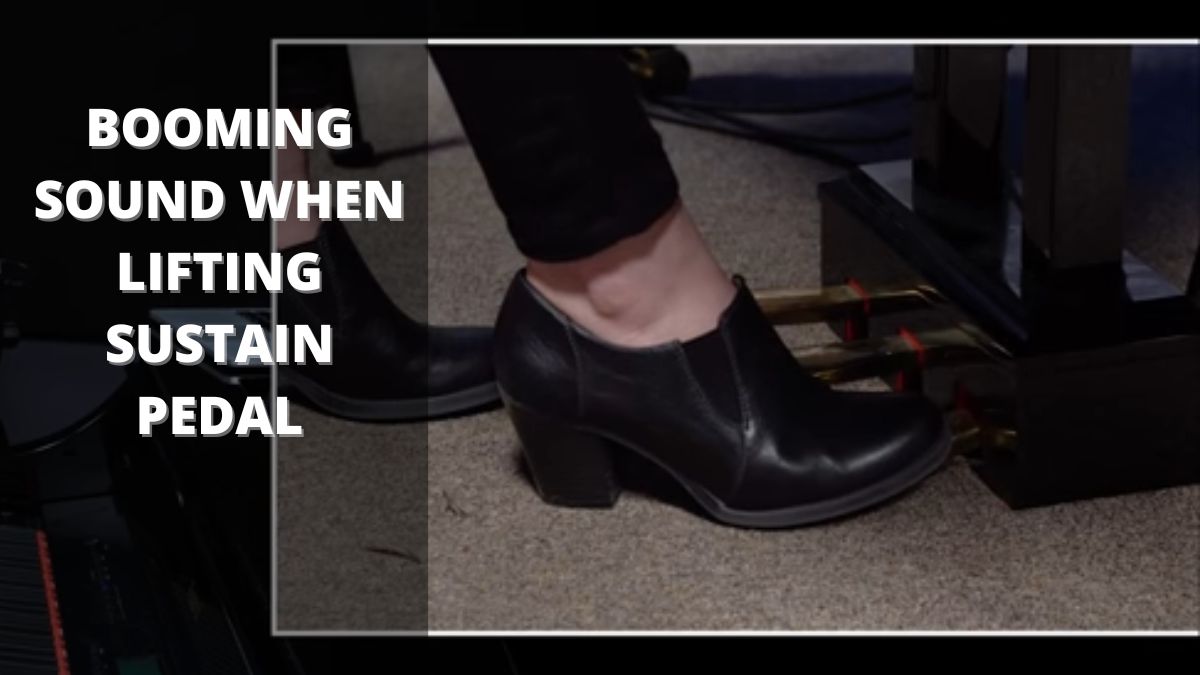A piano is one of the most popular instruments in the world, and for good reason. There’s just something about the sound of a piano that can’t be beaten. Whether you’re playing classical music or rock and roll, a piano always sounds amazing.
The question is what is this booming sound when lifting sustain pedal on an acoustic piano? The sound seems to come from the strings and may persist even after the pedal is released.
Possible causes of booming sound when lifting sustain pedal on acoustic piano
There are many things that can cause a piano to boom.
- The sustain pedal on an acoustic piano produces a booming sound when depressed. The sound is caused by the air pressure inside the piano becoming higher than the atmospheric pressure outside the piano. When the sustain pedal is depressed, more air is forced into and under the instrument’s strings, causing them to vibrate and produce the sound.
- One of the more common reasons is when the hammers hit the strings too hard. This can be caused by several factors, including how high the tuning pins are set, how tight the strings are, and how heavy the hammers are. If any of these factors are not correct, it can cause the piano to boom.
- Physical process that takes place in the strings of the instrument. When the hammer strikes the strings, they vibrate and create an audible sound. This phenomenon occurs because the string’s tension and length affect how loudly it will sound when struck. The longer the string, the less likely it will vibrate when struck.
- The strings of a piano are made from metal or synthetic materials. The length and tension of the strings determine how loudly they will sound when struck. The longer the string, the less likely it will vibrate when struck. The strings of a piano are made from metal or synthetic materials. The length and tension of the strings determine how loudly they will sound when struck.
Why does my piano pedal click?
If you’ve ever played the piano, then you know that each key has a corresponding pedal. When you press a key, the hammer inside the piano hits a string, which creates a sound. The sustain pedal is used to make the sound last longer. It’s usually located on the right side of the piano and is attached to the floor with a metal rod. When you press down on the pedal, it clicks.
Is a sustain pedal necessary?
When it comes to the question of whether a sustain pedal is necessary for playing the piano, the answer is yes. For beginning players, a sustain pedal can be helpful in learning how to play legato passages. However, once a player has developed proper technique, a sustain pedal is not that necessary for playing the piano. In fact, using a sustain pedal can often impede proper technique.
Do beginners use piano pedals?
Beginners often wonder if they are supposed to use the pedals and, if so, which ones. Beginners, like all pianists, use the pedals to play loud, soft, and dynamic passages. However, when beginning a new piece of music or a new piece on the piano, one should feel free to experiment with pedal usage without worrying about breaking musical rules.
Pedals can help a pianist to play in different keys, add expression to their playing, and create sounds not possible on the keyboard alone. However, there are some considerations that must be taken into account when using pedals, such as technique and muscle memory.
How can you fix the booming sound on your acoustic piano?
One of the drawbacks of acoustic pianos is that the sound can be quite boomy, especially in small spaces. This problem can be easily fixed by following a few simple steps.
- First, make sure that your piano is in the correct location. It should be away from walls and other objects that can reflect sound.
- You may also need to adjust the height of the stool or bench so that you are sitting in the correct position relative to the keys. If you are still experiencing problems with sound projection, try using a piano damper pedal to reduce resonance.
- Finally, if all else fails, you can use a sound dampener to muffle the sound of your piano.


